Charles E W Bean, Diaries, AWM38 3DRL 606/277/1 - 1926-1939 - Part 4
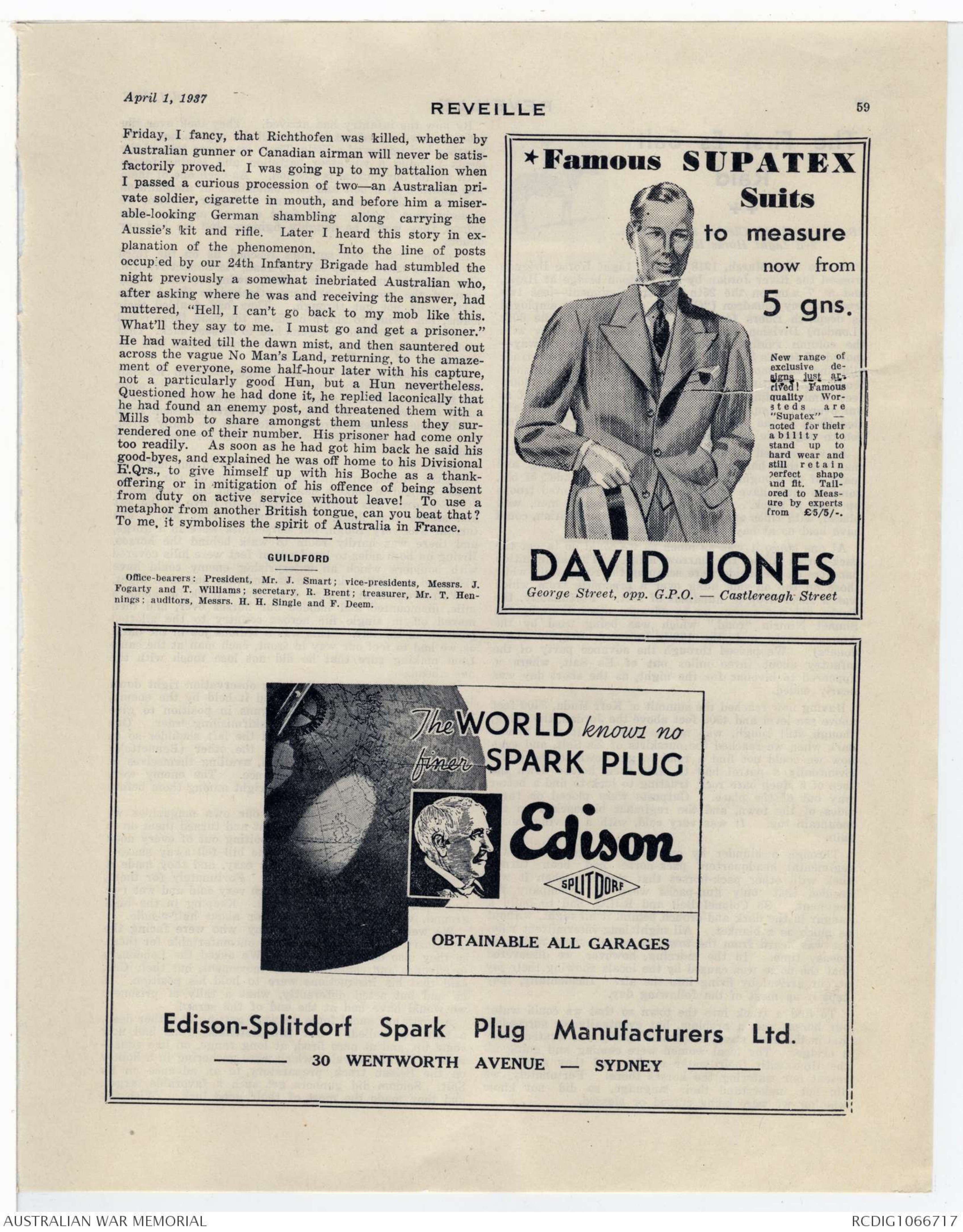
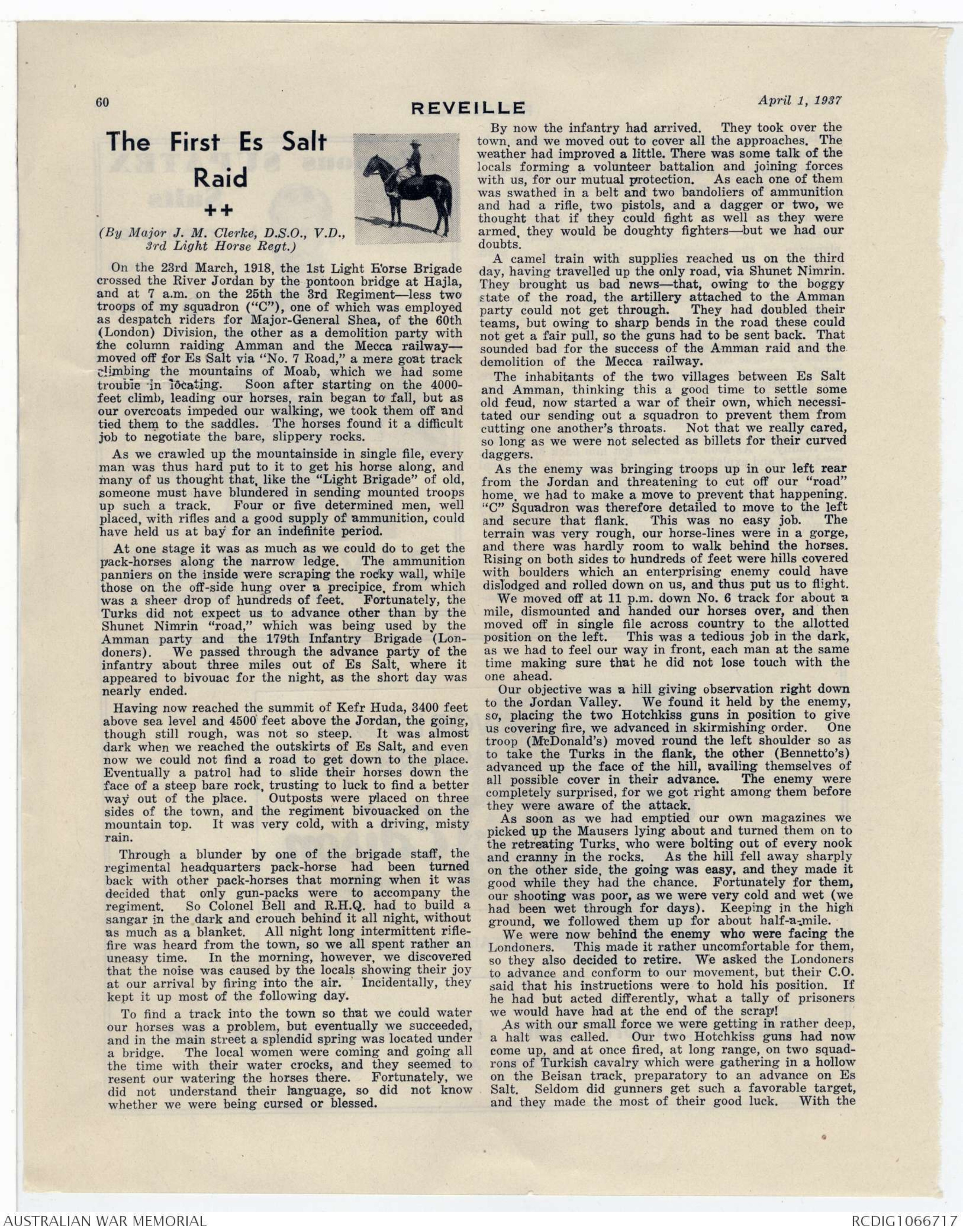
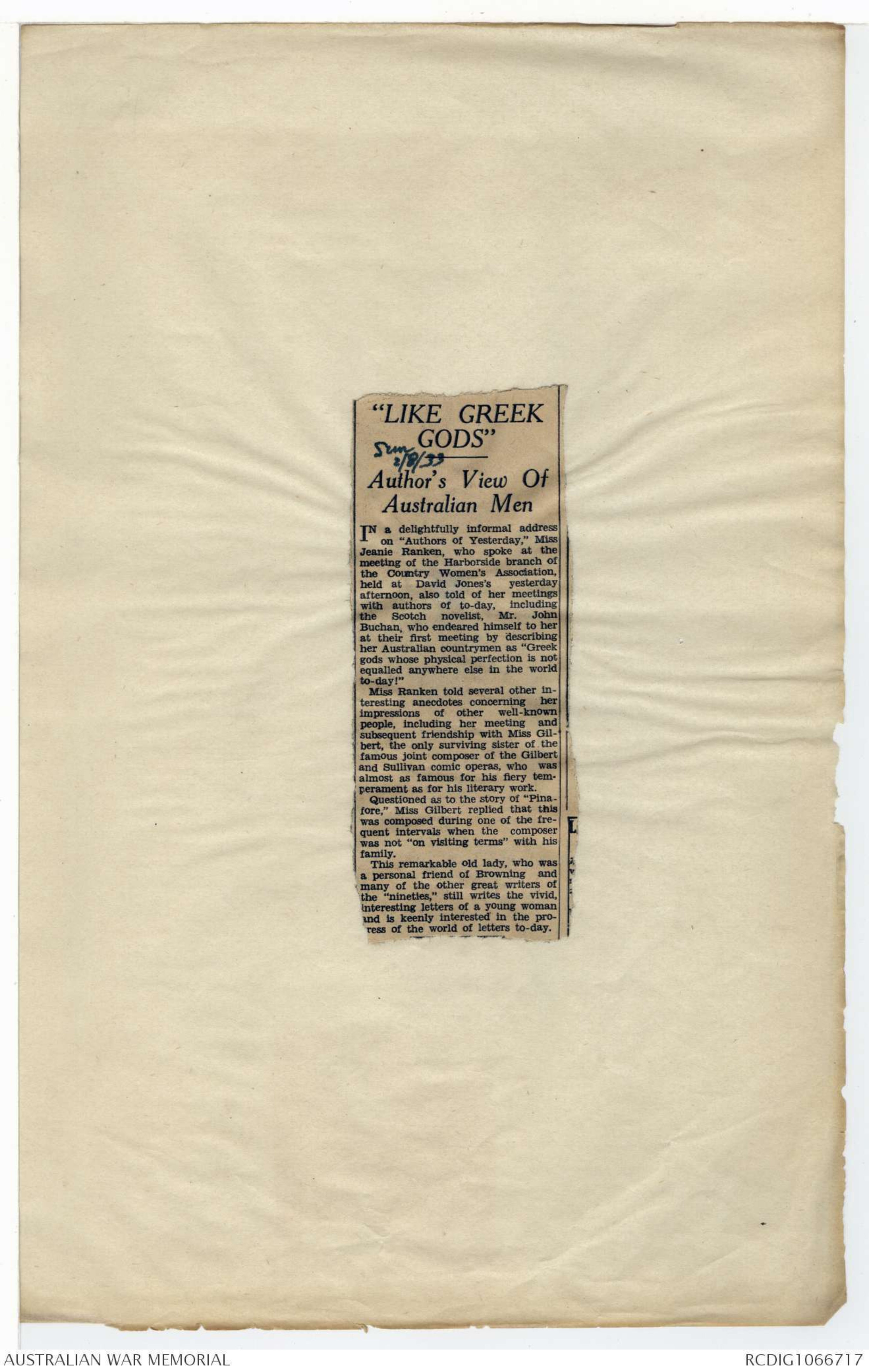
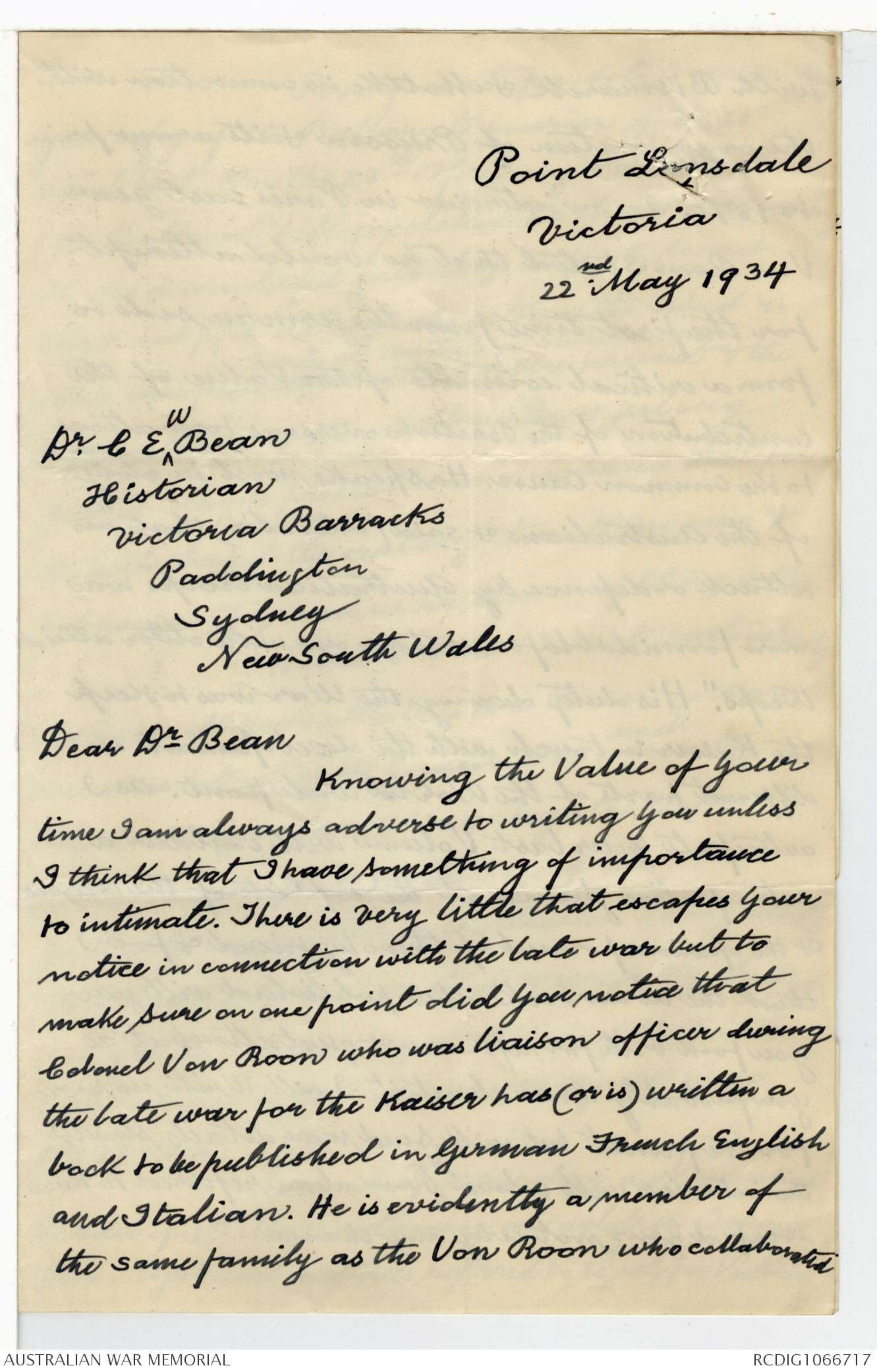
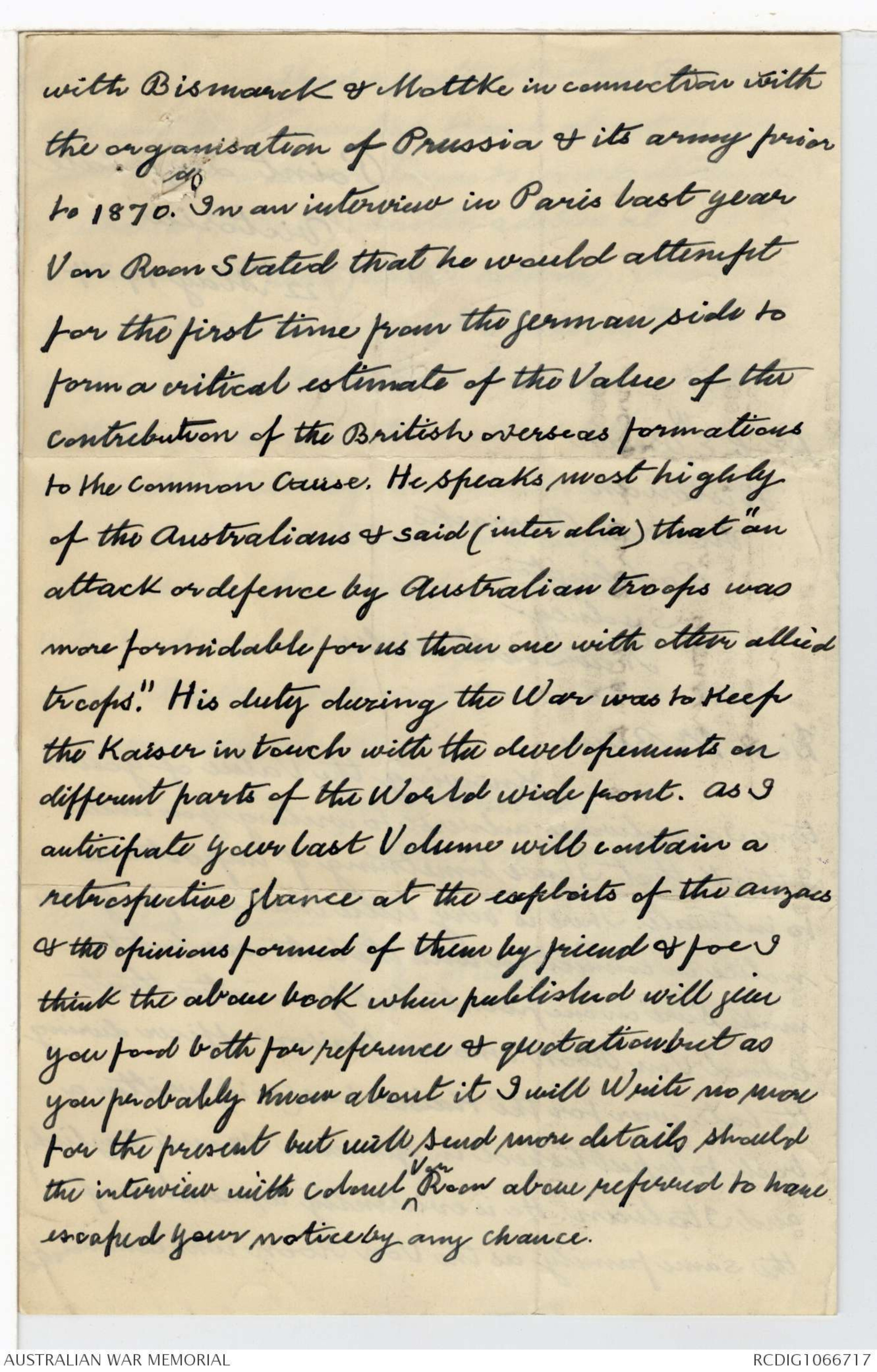
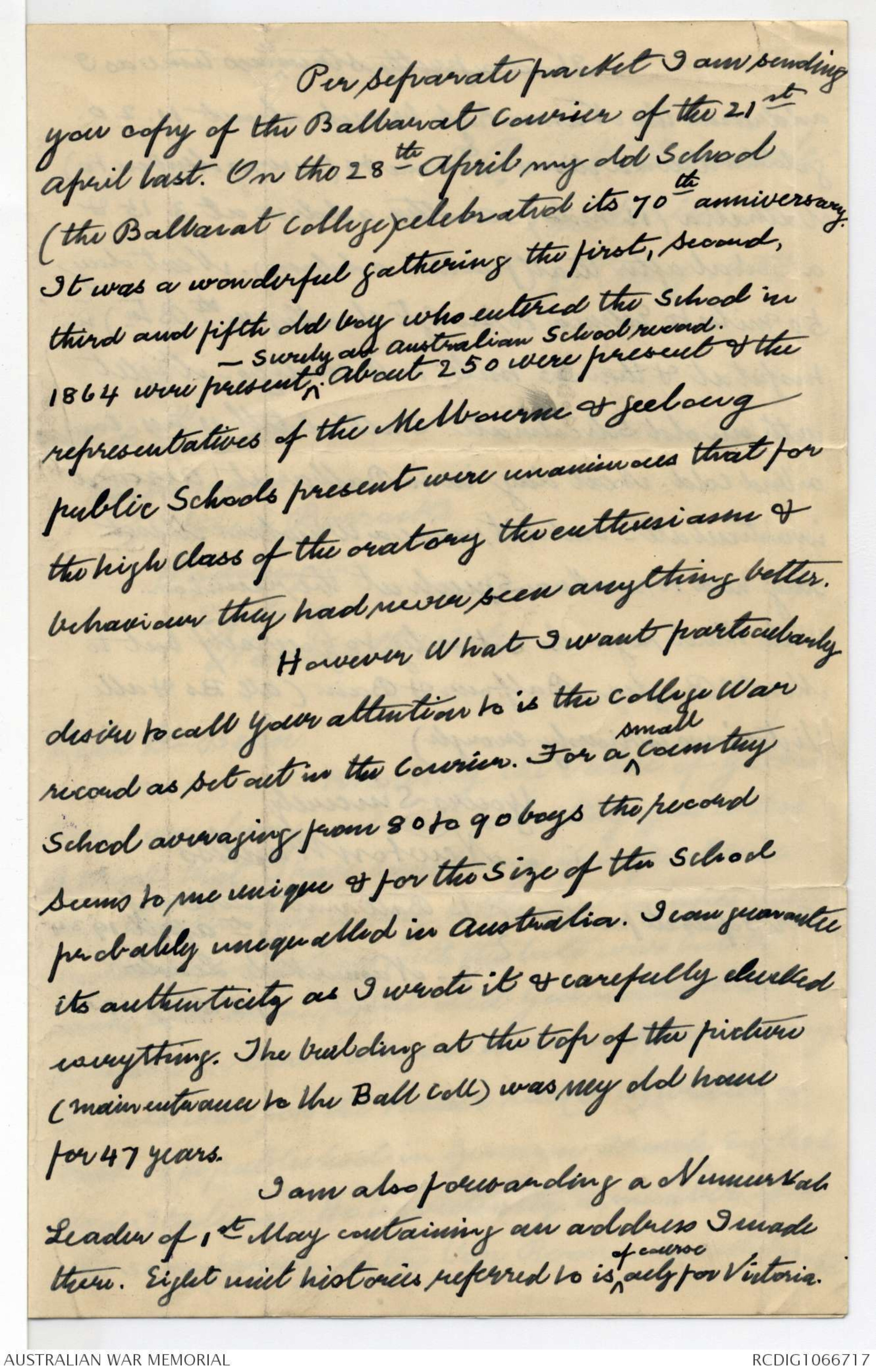
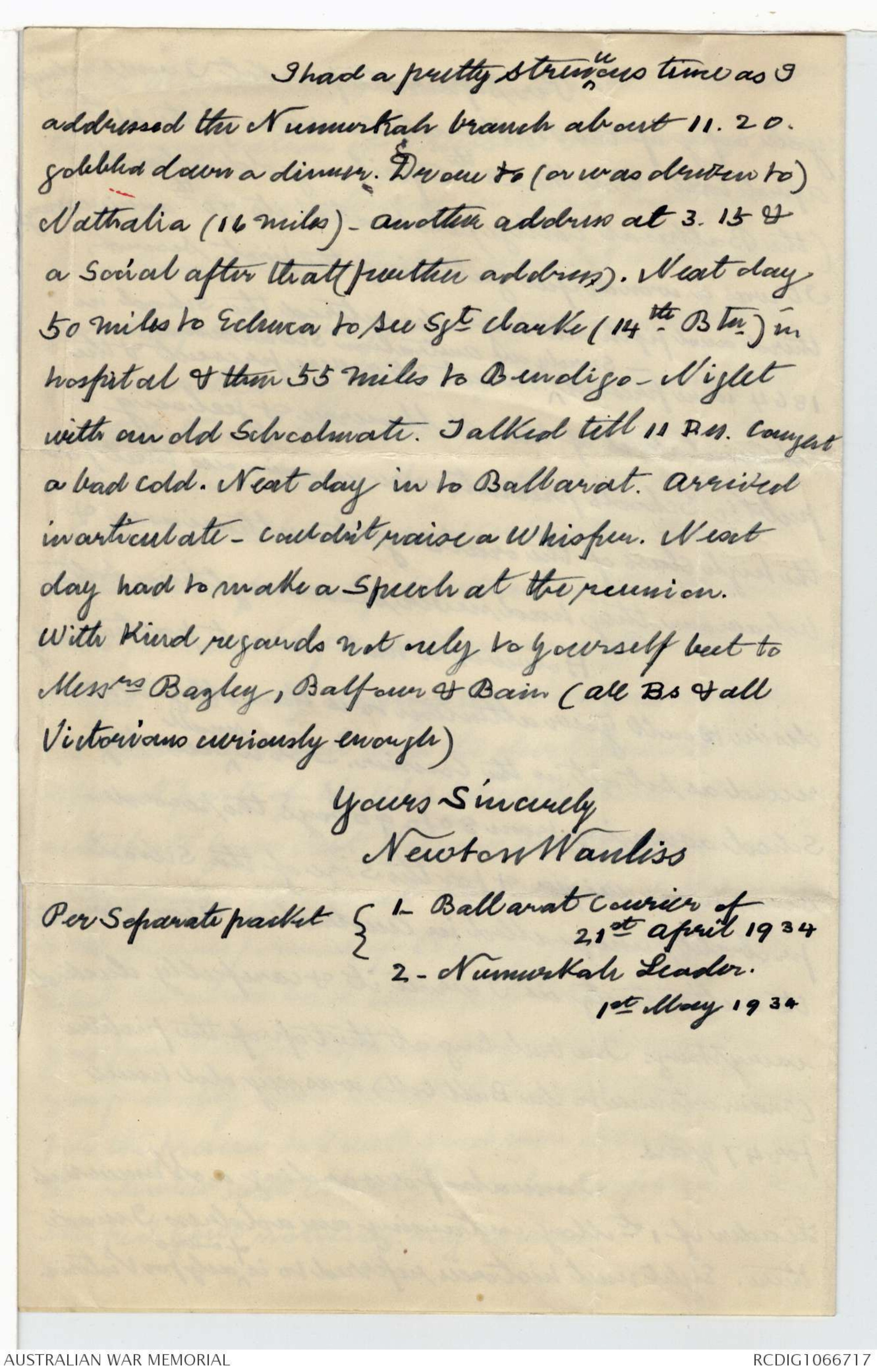
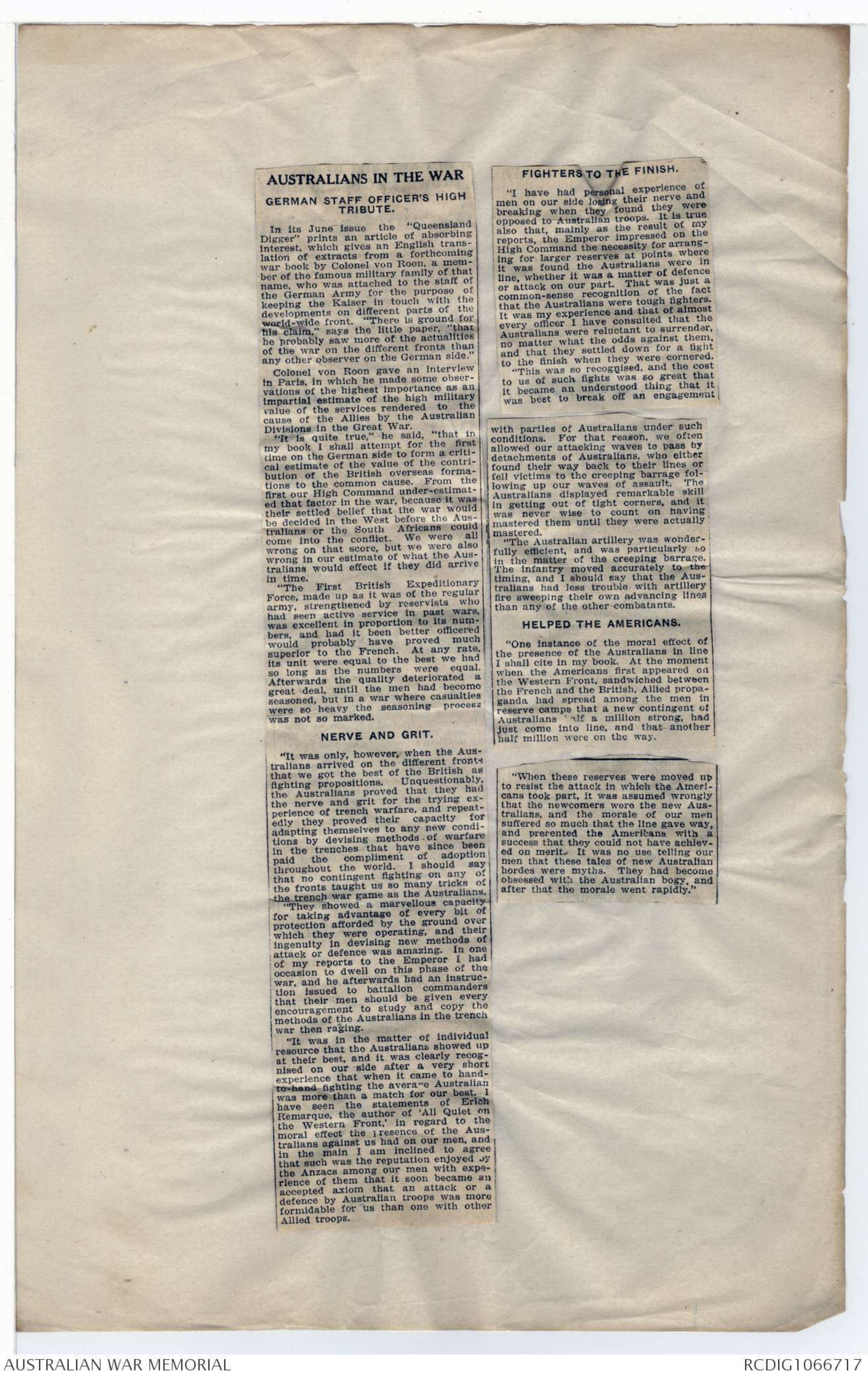
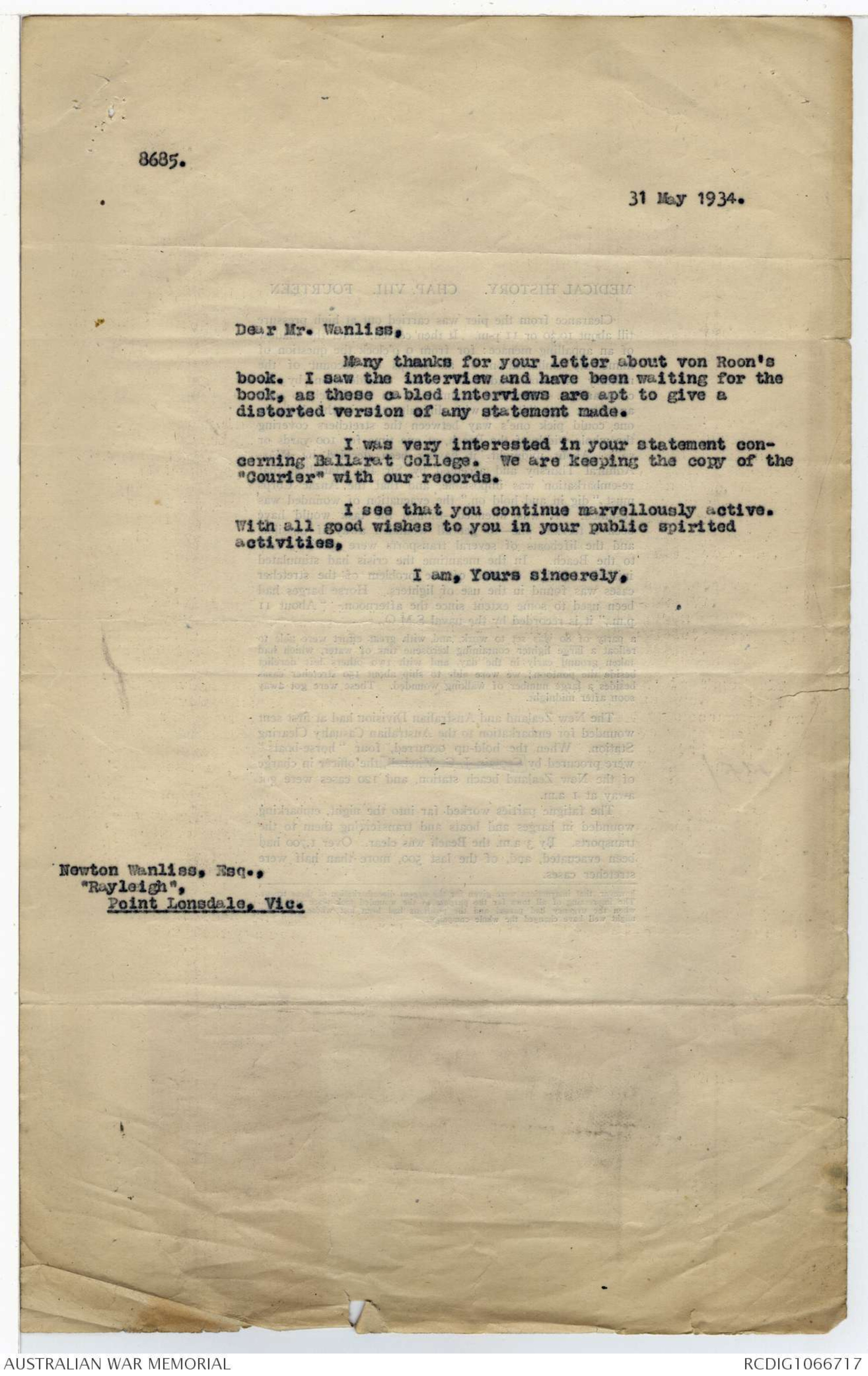
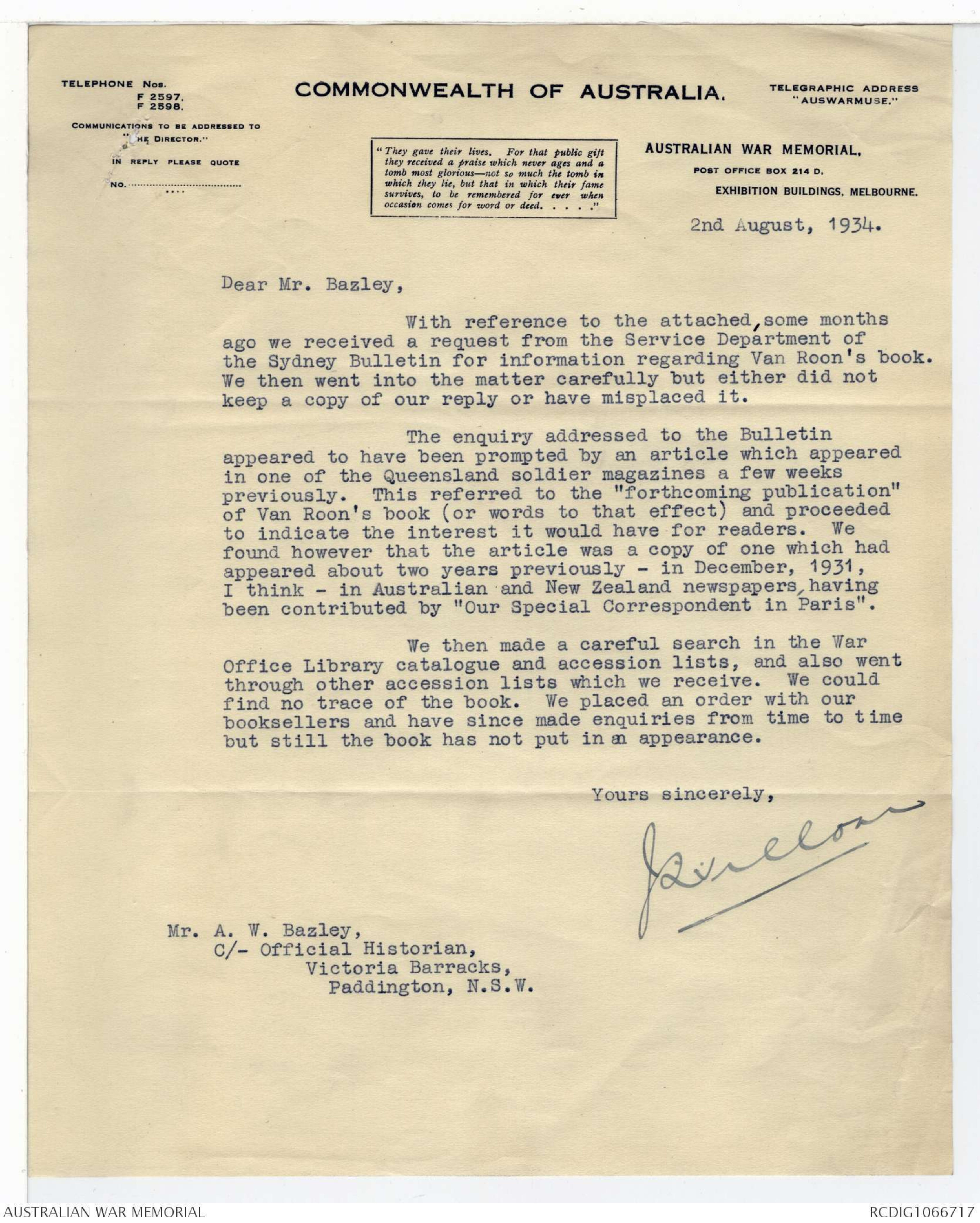
April 1, 1937 REVEILLE 59
Friday, I fancy, that Richthofen was killed, whether by
Australian gunner or Canadian airman will never be satis
factorily proved. I was going up to my battalion when
I passed a curious procession of two—an Australian private
soldier, cigarette in mouth, and before him a miserable
-looking German shambling along carrying the
Aussie’s kit and riffe. Later I heard this story in explanation
of the phenomenon. Into the line of posts
occuped by our 24th Infantry Brigade had stumbled the
night previously a somewhat inebriated Australian who,
after asking where he was and receiving the answer, had
muttered, Hell, I can't go back to my mob like this.
What'll they say to me. I must go and get a prisoner."
He had waited till the dawn mist, and then sauntered out
across the vague No Man’s Land, returning, to the amazement
of everyone, some half-hour later with his capture,
not a particularly good Hun, but a Hun nevertheless.
Questioned how he had done it, he replied laconically that
he had found an enemy post, and threatened them with a
Mills bomb to share amongst them unless they surrended
one of their number. His prisoner had come only
too readily. As soon as he had got him back he said his
good-byes, and explained he was off home to his Divisional
H.Qrs., to give himself up with his Boche as a thank-
offering or in mitigation of his offence of being absent
from duty on active service without leavel To use a
metaphor from another British tongue, can you beat that?
To me, it symbolises the spirit of Australia in France.
GUILDFORD
Office-bearers: President, Mr. J. Smart; vice-presidents, Messrs. J.
Fogarty and T. Williams; secretary, R. Brent; treasurer, Mr. T. Hennings;
auditors, Messrs. H. H. Single and F. Deem.
Famous Supatex
Suits
Davis Jones
George Street, opp. G.P.O- Castlereagh Street.
Edison
Splitdorf Spark Plug Manufacturers
30 WENTWORTH AVENUE SYDNEY.
60 REVEILLE April 1, 1937
The First Es Salt Raid
(By Major J. M. Clerke, D.S.O., V.D.,
3rd Light Horse Regt.)
On the 23rd March, 1918, the 1st Light Horse Brigade
crossed the River Jordan by the pontoon bridge at Hajla,
and at 7 a.m. on the 25th the 3rd Regiment—less two
troops of my squadron ("C"), one of which was employed
as despatch riders for Major-General Shea, of the 60th
(London) Division, the other as a demolition party with
the column raiding Amman and the Mecca railway-
moved off for Es Salt via No. 7 Road, a mere goat track
climbing the mountains of Moab, which we had some
trouble in locating. Soon after starting on the 4000-
feet climb, leading our horses, rain began to fall, but as
our overcoats impeded our walking, we took them off and
tied them to the saddles. The horses found it a difficult
job to negotiate the bare, slippery rocks.
As we crawled up the mountainside in single file, every
man was thus hard put to it to get his horse along, and
many of us thought that, like the Light Brigade’ of old,
someone must have blundered in sending mounted troops
up such a track. Four or five determined men, well
placed, with rifles and a good supply of ammunition, could
have held us at bay for an indefinite period.
At one stage it was as much as we could do to get the
pack-horses along the narrow ledge.
The ammunition
panniers on the inside were scraping the rocky wall, while
those on the off-side hung over a precipice, from which
was a sheer drop of hundreds of feet. Fortunately, the
Turks did not expect us to advance other than by the
Shunet Nimrin “road” which was being used by the
Amman party and the 179th Infantry Brigade (Lon-
doners). We passed through the advance party of the
infantry about three miles out of Es Salt, where it
appeared to bivouac for the night, as the short day was
nearly ended.
Having now reached the summit of Kefr Huda, 3400 feet
above sea level and 4500 feet above the Jordan, the going,
though still rough, was not so steep. It was almost
dark when we reached the outskirts of Es Salt, and even
now we could not find a road to get down to the place.
Eventually a patrol had to slide their horses down the
face of a steep bare rock, trusting to luck to find a better
way out of the place. Outposts were placed on three
sides of the town, and the regiment bivouacked on the
mountain top. It was very cold, with a driving, misty
rain.
Through a blunder by one of the brigade staff, the
regimental headquarters pack-horse had been turned
back with other pack-horses that morning when it was
decided that only gun-packs were to accompany the
regiment. So Colonel Bell and R.H.Q. had to build a
sangar in the dark and crouch behind it all night, without
as much as a blanket. All night long intermittent rifle
Pick,o
fire was heard from the town, so we all spent rather an
uneasy time. In the morning, however, we discovered
that the noise was caused by the locals showing their joy
at our arrival by firing into the air. Incidentally, they
kept it up most of the following day.
To find a track into the town so that we could water
our horses was a problem, but eventually we succeeded,
and in the main street a splendid spring was located under
a bridge. The local women were coming and going all
the time with their water crocks, and they seemed to
resent our watering the horses there. Fortunately, we
did not understand their language, so did not know
whether we were being cursed or blessed.
By now the infantry had arrived. They took over the
town and we moved to cover all the approaches. The
weather improved a little. There was some talk of the
locals forming a volunteer battalion and joining forces
with us, for our mutual protection. As each on of them
was swathed in a belt and two bandoliers of ammunition
and had a rifle, two pistols, and a dagger or two, we
thought that if they could fight as well as they were
armed, they would be doughty fighters - but we had our
doubts.
A camel train with supplies reached us on the third
day, having travelled up the only road, via Shunet Nimrin.
They brought us bad news—that, owing to the boggy
state of the road, the artillery attached to the Amman
could not get through. They had doubled their
teams, but owing to sharp bends in the road these could
not get a fair pull, so the guns had to be sent back. That
sounded bad for the success of the Amman raid and the
demolition of the Mecca railway.
The inhabitants of the two villages between Es Salt
and Amman, thinking this a good time to settle some
old feud, now started a war of their own, which necessitated
our sending out a squadron to prevent them from
cutting one another's throats. Not that we really cared,
so long as we were not selected as billets for their curved
daggers.
As the enemy was bringing troops up in our left rear
from the Jordan and threatening to cut off our road
home we had to make a move to prevent that happening.
C Squadron was therefore detailed to move to the left
and secure that flank. This was no easy job. The
terrain was very rough, our horse-lines were in a gorge,
and there was hardly room to walk behind the horses.
Rising on both sides to hundreds of feet were hills covered
with boulders which an enterprising enemy could have
dislodged and rolled down on us, and thus put us to flight.
We moved off at 11 p.m. down No. 6 track for about a
mile, dismounted and handed our horses over, and then
moved off in single file across country to the allotted
position on the left. This was a tedious job in the dark,
as we had to feel our way in front, each man at the same
time making sure that he did not lose touch with the
one ahead. Our objective was a hill giving observation right down
to the Jordan Valley. We found it held by the enemy,
so, placing the two Hotchkiss guns in position to give
us covering fire, we advanced in skirmishing order. One
troop (McDonald's) moved round the left shoulder so as
to take the Turks in the Hank, the other (Bennetto's)
advanced up the face of the hill, availing themselves of
all possible cover in their advance. The enemy were
completely surprised, for we got right among them before
they were aware of the attack.
As soon as we had emptied our own magazines we
picked up the Mausers lying about and turned them onto
the retreating Turks, who were bolting out of every nook
and cranny in the rocks. As the hill fell away sharply
on the other side, the going was easy, and they made it
good while they had the chance. Fortunately for them,
our shooting was poor, as we were very cold and wet (we
had been wet through for days). Keeping in the high
ground, we followed them up for about half-a-mile.
We were now behind the enemy who were facing the
Londoners. This made it rather uncomfortable for them,
so they also decided to retire. We asked the Londoners
to advance and conform to our movement, but their C.O.
said that his instructions were to hold his position. If
he had but acted differently, what a tally of prisoners
we would have had at the end of the scrap!
As with our small force we were getting in rather deep,
a halt was called. Our two Hotchkiss guns had now
come up, and at once fired, at long range, on two squadrons
of Turkish cavalry which were gathering in a hollow
on the Beisan track, preparatory to an advance on Es
Salt. Seldom did gunners get such a favorable target,
and they made the most of their good luck. With the
"LIKE GREEK GODS"
Author's View Of
Australian Men
IN a delightfully informal address
on "Authors of Yesterday,"- Miss
Jeanie Ranken, who spoke at the
meeting of the Harborside branch of
the Country Women's Association,
held at David Jones's yesterday
afternoon, also told of her meetings
with authors of to-day, including
the Scotch novelist, Mr. John
Buchan, who endeared himself to her
at their first meeting by describing
her Australian countrymen as "Greek
gods whose physical perfection is not
equalled anywhere else in the world)
to-day!"
Miss Ranken told several
other interesting
anecdotes concerning her
impressions of other well-known
people, including her meeting and
subsequent friendship with Miss Gilbert,
the only surviving sister of the
famous joint composer of the Gilbert
and Sullivan comic operas, who was
almost as famous for his fiery
temperament
as for his literary work.
Questioned as to the story of "Pinafore,"
Miss Gilbert replied that this
was composed during one of the frequent
intervals when the composer
was not "on visiting terms" with his
family.
This remarkable old lady, who was
a personal friend of Browning and
many of the other great writers of
the "nineties," still writes the vivid,
interesting letters of a young woman
and is keenly interested in the progress
of the world of letters to-day.
Point Lonsdale
Victoria
22nd May 1934
Dr C E ^W Bean
Historian
Victoria Barracks
Paddington
Sydney
New South Wales
Dear Dr Bean
knowing the value of your
time I am always adverse to writing you unless
I think that I have something of importance
to intimate. There is very little that escapes your
notice in connection with the late war but to
make sure on one point did you notice that
Colonel Von Roon who was liaison officer during
the late war for the Kaiser has (or is) written a
book to be published in German French English
and Italian. He is evidently a member of
the same family as the Von Roon who collaborated
with Bismarck & Mottke in connection with
the organisation of Prussia & its army prison
to 1870. In an interview in Paris last year
Von Roon stated that he would attempt
for the first time from the German side to
form a critical estimate of the value of the
contribution of the British overseas formations
to the common cause. He speaks most highly
of the Australians & said (inter alia) that "an
attack or defence by Australian troops was
more formidable for us than one with other allied
troops." His duty during the War was to keep
the Kaiser in touch with the developements on
different parts of the World wide front. As I
anticipate your last Volume will contain a
retrespective glance at the exploits of the Anzacs
& the opinions formed of them by friend & foe I
think the above book when published will give
you food both for reference & quotation but as
you probably know about it I will write no more
for the present but will send more details should
the interview with Colonel ^Von Roon
above referred to have
escaped your notice by any chance.
Per separate packet I am sending
you copy of the Ballarat Courier of the 21st
april last. On the 28th April my old school
(the Ballarat College) celebrated its 70th anniversary.
It was a wonderful gathering the first, second
third and fifth old boy who entered the school in
1864 were present ^ surely an Australian school record
About 250 were present & the
representatives of the Melbourne & Geelong
public schools present were unanimous that for
the high class of the oratory the enthusiasm &
behaviour they had never seen anything better.
However what I want particularly
desire to call your attention to is the college War
record as set out in the Courier. For a ^small country
school averaging from 80 to 90 boys the record
seems to me unique & for the size of the school
probably unequalled in Australia. I can guarantee
its authenticity as I wrote it & carefully checked
everything. The building at the top of the picture
(main entrance to the Ball coll) was my old house
for 47 years.
I am also forwarding a Numurkah
Leader of 1st May containing an address I made
there. Eight unit histories referred to is ^of course
only for Victoria.
I had a pretty stren^uous time as I
addressed the Numurkah branch about 11.20.
gobbled dawn a dinner. Drove to (or was driven to)
Nathalia (16 miles) - another address at 3.15 &
a social after that (further address). Next day
50 miles to Echuca to see Sgt Clarke (14th - Btn.) in
hospital & then 55 miles to Bendigo- Night
with an old schoolmate. Talked till 11 p.m. Caught
a bad cold. Next day in to Ballarat. Arrived
inarticulate - couldn't raise a whisper. Next
day had to make a speech at the reunion.
With kind regards not only to yourself but to
Messrs Bagley, Balfour & Bain (all Bs & all
Victorians curiously enough)
Yours Sincerely
Newton Wanliss
Per Separate packet { 1- Ballarat Courier of
21st April 1934
2- Numurkah Leader.
1st May 1934
AUSTRALLANS IN THE WAR
GERMAN STAFF OFFICER'S HIGH
TRIBUTE.
In its June issue the "Queensland
Digger" prints an article of absorbing
interest, which gives an English translation
of extracts from a forthcoming
war book by Colonel von Roon, a member
of the famous military family of that
name, who was attached to the staff of
the German Army for the purpose of
keeping the Kaiser in touch with the
developments on different parts of the
world-wide front. "There is ground for
his claim," says the little paper, "that
he probably saw more of the actualities
of the war on the different fronts than
any other observer on the German side."
Colonel von Roon gave an interview
in Paris, in which he made some observations
of the highest importance as an
impartial estimate of the high military
value of the services rendered to the
cause of the Allies by the Australlan
Divisions in the Great War.
"It is quite true," he said, "that in
my book I shall attempt for the first
time on the German side to form a critical
estimate of the value of the contribution
of the British overseas formations
to the common cause. From the
first our High Command under-estimated
that factor in the war, because it was
their settled belief that the war would
be decided in the West before the Australians
or the South Africans could
come into the conflict. We were all
wrong on that score, but we were also
wrong in our estimate of what the Australians
would effect if they did arrive
in time.
"The First British Expeditionary
Force, made up as it was of the regular
army, strengthened by reservists who
had seen active service in past wars,
was excellent in proportion to its numbers,
and had it been better officered
would probably have proved much
superior to the French. At any rate.
its unit were equal to the best we had
so long as the numbers were equal.
Afterwards the quality deteriorated a
great deal, until the men had become
seasoned, but in a war where casualties
were so heavy the seasoning process
was not so marked.
NERVE AND GRIT.
"It was only, however, when the Australians
arrived on the different fronts
that we got the best of the British as
fighting propositions. Unquestionably,
the Australlans proved that they had
the nerve and grit for the trying experience
of trench warfare, and repeatedly
they proved their capacity for
adapting themselves to any new conditions
by devising methods of warfare
in the trenches that have since been
paid the compliment of adoption
throughout the world. I should say
that no contingent fighting on any of
the fronts taught us so many tricks of
the trench war game as the Australians.
"They showed a marvellous capacity
for taking advantage of every bit of
protection afforded by the ground over
which they were operating, and their
ingenuity in devising new methods of
attack or defence was amazing. In one
of my reports to the Emperor I had
occasion to dwell on this phase of the
war, and he afterwards had an instruction
issued to battalion commanders
that their men should be given every
encouragement to study and copy the
methods of the Australians in the trench
war then raging.
"It was in the matter of individual
resource that the Australians showed up
at their best, and it was clearly recognised
on our side after a very short
experience that when it came to hand-
to-hand fighting the average Australian
was more than a match for our best. I
have seen the statements of Erich
Remarque, the author of 'All Quiet on
the Western Front,' in regard to the
moral effect the presence of the Australians
against us had on our men, and
in the main I am inclined to agree
that such was the reputation enjoyed by
the Anzacs among our men with experience
of them that it soon became an
accepted axiom that an attack or a
defence by Australlan troops was more
formidable for us than one with other
Allied troops.
FIGHTERS TO THE FINISH
"I have had personal experience of
men on our side losing their nerve and
breaking when they found they were
opposed to Australian troops. It is true
also that, mainly as the result of my
reports, the Emperor impressed on the
High Command the necessity for arranging
for larger reserves at points where
it was found the Australians were in
line, whether it was a matter of defence
or attack on our part. That was just a
common-sense recognition of the fact
that the Australlans were tough fighters.
It was my experience and that of almost
every officer I have consulted that the
Australians were reluctant to surrender,
no matter what the odds against them,
and that they settled down for a fight
to the finish when they were cornered.
"This was so recognised, and the cost
to us of such fights was so great that
it became an understood thing that it
was best to break off an engagement
with parties of Australians under such
conditions. For that reason, we often
allowed our attacking waves to pass by
detachments of Australians, who either
found their way back to their lines or
fell victims to the creeping barrage following
up our waves of assault. The
Australlans displayed remarkable skill
in getting out of tight corners, and it
was never wise to count on having
mastered them until they were actually
mastered.
"The Australian artillery was wonderfully
efficlent, and was particularly so
in the matter of the creeping barrage
The infantry moved accurately to the
timing, and I should say that the Australians
had less trouble with artillery
fire sweeping their own advancing lines
than any of the other combatants.
HELPED THE AMERICANS.
"One instance of the moral effect of
the presence of the Australians in line
I shall cite in my book. At the moment
when the Americans first appeared on
the Western Front, sandwiched between
the French and the British, Allied propaganda
had spread among the men in
reserve camps that a new contingent of
Australians half a million strong, had
just come into line, and that another
half million were on the way.
"When these reserves were moved up
to resist the attack in which the Americans
took part, it was assumed wrongly
that the newcomers were the new Australians,
and the morale of our men
suffered so much that the line gave way,
and presented the Americans with a
success that they could not have achieved
on merit. It was no use telling our
men that these tales of new Australian
hordes were myths. They had become
obsessed with the Australian bogy, and
after that the morale went rapidly.
8685.
31 May 1934.
Dear Mr. Wanliss,
Many thanks for your letter about von Roon's
book. I saw the interview and have been waiting for the
book, as these cabled interviews are apt to give a
distorted version of any statement made.
I was very interested in your statement concerning
Ballarat College. We are keeping the copy of the
"Courier" with our records.
I see that you continue marvellously active.
With all good wishes to you in your public spirited
activities,
I am, Yours sincerely.
Nowton Wanliss, Esq.,
"Rayleigh"
Point Lonsdale, Vic.
TELEPHONE Nos.
F 2597
F 2598
COMMUNICATIONS TO RE ADDRESSED T0
"THE DIRECTOR."
IN REPLY PLEASE QUOTE
NO.
TELEGRAPHIC ADDRESS
"AUSWARMUSE."
COMMONWEALTH OF AUSTRALIA.
AUSTRALLAN WAR MEMORIAL.
POST OFFICE BOX 214 D,
EXHIBITION BUILDINGS, MELBOURNE.
"They gave their lives. For that public gift
they received a praise which never ages and a
tomb most glorious—not so much the tomb in
which they lie, but that in which their fame
survives, to be remembered for ever when
occasion comes for word or deed...."
2nd August, 1934.
Dear Mr. Bazley,
With reference to the attached, some months
ago we received a request from the Service Department of
the Sydney Bulletin for information regarding Van Roon's book.
We then went into the matter carefully but either did not
keep a copy of our reply or have misplaced it.
The enquiry addressed to the Bulletin
appeared to have been prompted by an article which appeared
in one of the Queensland soldier magazines a few weeks
previously. This referred to the "forthcoming publication"
of Van Roon’s book (or words to that effect) and proceeded
to indicate the interest it would have for readers. We
foind however that the article was a copy of one which had
appeared about two years previously - in December, 1931,
I think - in Australian and New Zealand newspapers, having
been contributed by "Our Special Correspondent in Paris".
We then made a careful search in the War
Office Library catalogue and accession lists, and also went
through other accession lists which we receive. We could
find no trace of the book. We placed an order with our
booksellers and have since made enquiries from time to time
but still the book has not put in on appearance.
Yours sincerely,
[[?]]
Mr. A. W. Bazley,
C/-Official Historian,
Victoria Barracks
Paddington, N.S.W.
 Sam scott
Sam scottThis transcription item is now locked to you for editing. To release the lock either Save your changes or Cancel.
This lock will be automatically released after 60 minutes of inactivity.